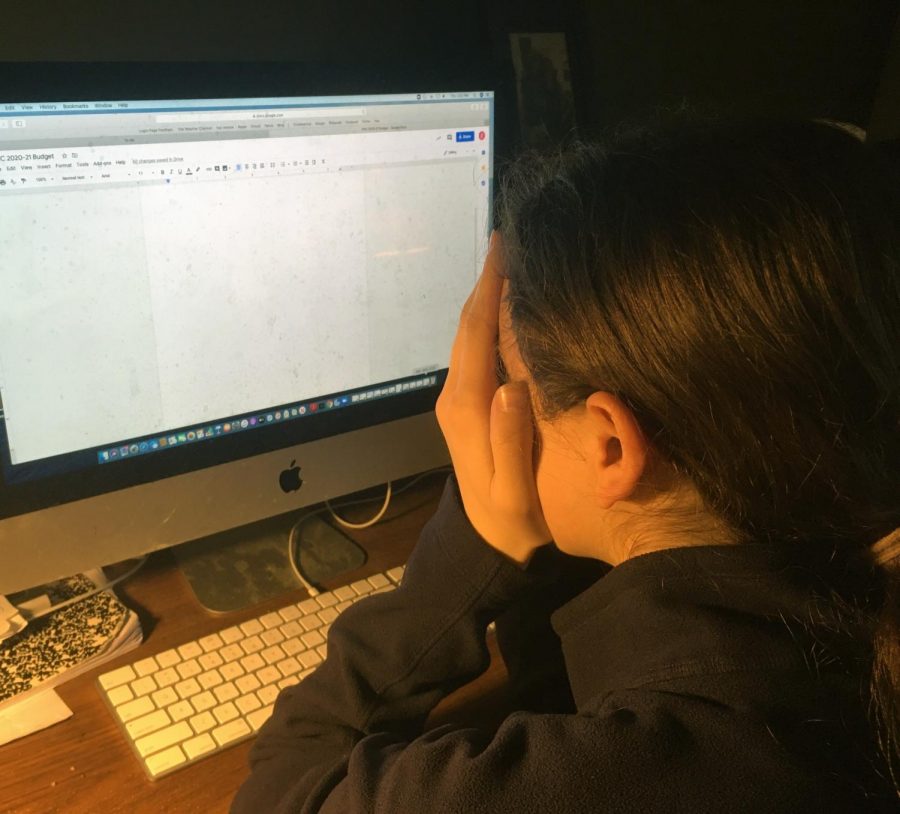Stop Expecting Students to Function Normally During the Coronavirus Pandemic
The stress of striving for academic success has put extra pressure on many students at this time. “I simply do not have the emotional energy to participate in class when I know I am living during one of the most deadly events in U.S. history,” Sims writes.
April 28, 2020
On Wednesday, March 11, the day of my first online class after Fordham announced the suspension of face-to-face instruction due to the coronavirus, I knew my semester would be like nothing I ever could have anticipated. I couldn’t help but wonder — am I really expected to be continuing with my coursework as normal right now?
As a college student quarantining during the coronavirus outbreak, I’m left wondering what exactly I’m supposed to be doing, knowing that thousands of people are dying outside my house. I feel too young to know how or why I’m supposed to pretend like everything is fine as I stare at my computer screen during another Zoom lecture. The world has come to a standstill and I find it unsettling that I’m expected to perform just as well academically as I would if classes were still on campus.
For Gen Z, our entire lives have been plagued with a never-ending stream of crises. I’m too young to remember 9/11 but know how it changed the country forever. I saw all the news coverage about terrorist attacks that occurred in the following years and never knew how to respond to them. My entire middle and high school career was shaped by my fear of knowing how frequent school shootings were. We never knew when the next tragedy would strike.
Over the course of our short lives, Gen Z has become the “thoughts and prayers” generation.
Amid all the wars, natural disasters, protests and countless other life-altering events Gen Z has experienced, we’ve been told to push on and cling to the hope that our government would intervene for our safety. In reality, nothing ever seemed to change, and we were still forced to go to school, barely acknowledging the events going on in the world around us.
The world around us never stopped when another tragedy struck, but now during the coronavirus pandemic, it has. You can’t tell me to carry on with my schoolwork anymore when nothing about my life is anywhere near normal.
As someone who has sacrificed my well-being for the sake of good grades for the majority of my educational career, I feel perpetually stuck in the motions that have come with online learning. I have no will to type my essays, my online exams feel futile and I simply do not have the emotional energy to participate in class when I know I am living during one of the most deadly events in U.S. history. It baffles me that the well-being of students is an afterthought when it comes to our grades and workload. I know I am not getting the most out of my education due to the effects of the coronavirus and I cannot see why academia is not universally acknowledging this.
It’s completely mind-numbing to sit in front of my laptop all day attending Zoom lectures and writing papers when my life is a shell of what it once was. No amount of “quarantine self-care” content on the internet can eliminate the underlying fact that I’m still expected to produce the quality of work I could before the coronavirus outbreak. Given the circumstances students are faced with right now, Fordham needs to take measures to alleviate the stress of our coursework.
As students worry about their health and the health of their family members, it is unreasonable to expect that this large amount of stress will not impact their ability to produce quality coursework. Yes, we’re home and have some more time on our hands, but in a world where taking a trip to the grocery store is deemed dangerous, it becomes increasingly difficult to care about assignments to the same degree as we could months ago.
It is no secret that the coronavirus is causing serious effects on people’s mental health as we are cut off from most in-person interaction with friends and family. The overwhelming sense of loneliness the coronavirus has caused due to quarantining measures has resulted in people losing one of their basic forms of identity — human interaction. When it is so apparent that people’s mental health is rapidly declining as a result of the coronavirus, I can’t help but cringe at people’s attempts to make light of the quirks that come with online learning instead of acknowledging the detrimental effects it is taking on the health of students.
I consider myself lucky. I have professors who are accommodating and open to feedback regarding their teaching during this time period. I also commend them on adapting their entire course to an online format on such short notice. However, on some occasions, this has come at the cost of assigning extra work and making assignments more difficult due to the increase of available time and resources.
I know I am extremely fortunate to be receiving a college education at Fordham, but given the circumstances of the coronavirus outbreak and its drastic effects on the lives of students, the expectations of academic performance need to be lowered. The pass/fail deadline should have been extended until we get our final grades. Fordham needs to establish university-wide policies that alleviate some of the stress of coursework. Having professors extend deadlines and grade more holistically does not sacrifice the education we pay for, as we are already being forced to function in abnormal circumstances.
I find it hard to believe that anyone has the right answers regarding how students should be expected to function right now, but taking measures to remove some of the stress that comes with academia needs to be the start.













Anna Baxter • Apr 29, 2020 at 3:41 pm
You write very well Miss Sims! I agree that there should be grace extended to students during this semester. I do think we have to continue with our schoolwork though. Would you agree?